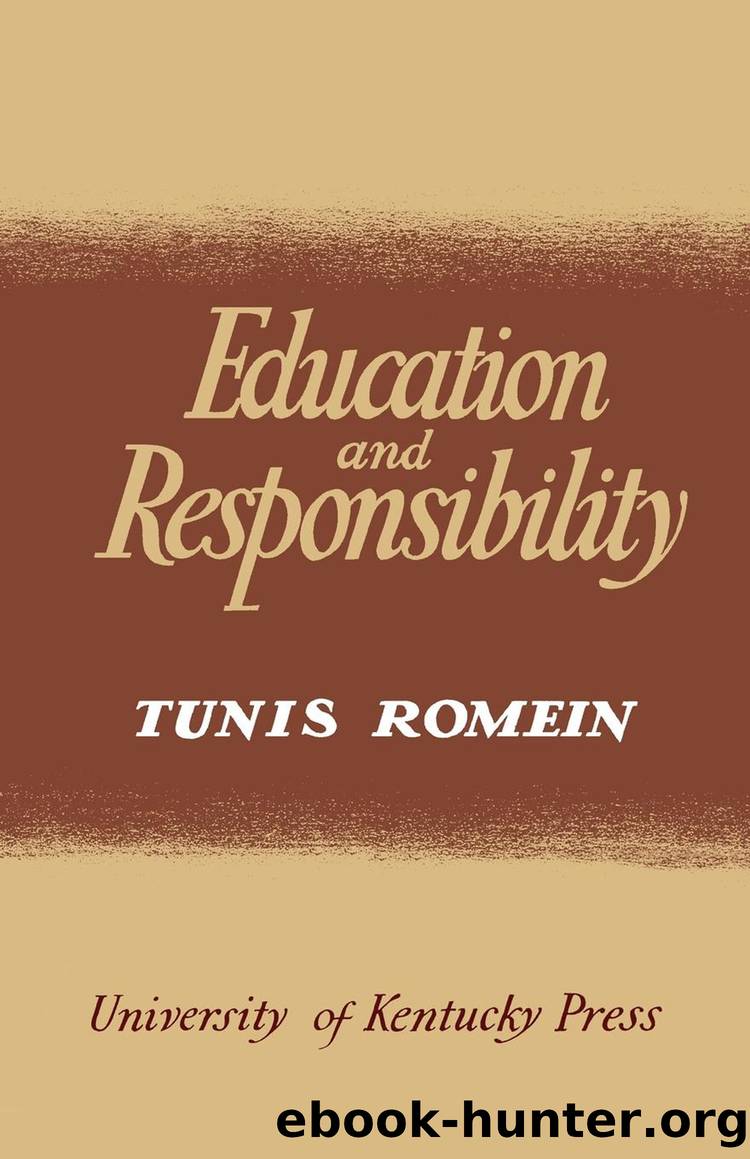Education and Responsibility by Romein Tunis;

Author:Romein, Tunis; [Romein, Tunis]
Language: eng
Format: epub
Publisher: University Press of Kentucky
Published: 2021-08-15T00:00:00+00:00
1 Brameld, Patterns of Educational Philosophy, 669-70.
2 B. Othanel Smith, William O. Stanley, and J. Harlan Shores, Fundamentals of Curriculum Development (Yonkers-on-Hudson, N. Y., 1950), 57.
3 Brameld, 506.
4 Summary of Brameldâs outlook.
5 Brameld, 541.
PART FOUR
Education, the Community, and Chrisian Faith
CHAPTER TEN
Education, the State, and Chrisian Faith
TODAY the proper relationship of Christian faith to public education is a serious problem. It is reasonably safe to say that the educational history of the United States is quite unintelligible apart from Christian faith. Christian influence is deeply felt not only by contemporary leaders in education, progressivists and classical humanists, but even by educational reconstructionists who admit certain Christian ethical forms pervading their otherwise non-Christian educational faith.
Although it is relatively simple to argue the vital historical relationship between Christian faith and public education, it seems extremely difficult to analyze this relationship. Education is complicated by its divergent philosophies, and Christendom is beset with its manifold variations of faith. These deviations in both areas create many tensions: philosophy against philosophy, faith against faith, and philosophy against faith.
Early American education was without doubt predominantly a Protestant Christian enterprise. A vigorous Reformation faith decreed that all men are individually accountable to a sovereign God; all men, therefore, ought to be taught to read the Bible in order to fulfill their theological responsibilities. So believed the early Puritans of New England who are credited with a major contribution to the religious foundations of the public school in America.
The same faith which emphasized strongly the responsibility of every man to God also insisted that all men are basically unreliable when they are tempted with power. When the problem of government was faced, it was decided that power and authority ought to be placed in the hands of many. A constitution was written which provided checks and balances to counteract the ever present human failing to misuse state power. By virtue of this lively Protestant faith in the sovereignty of God and manâs obligation to Him, along with a parallel distrust in the natural perfectibility of man, early America organized a unique kind of education and launched a remarkable governmental experiment in the new world. Both the new education and the new state proceeded âunder God,â and both proclaimed that âin God we trust.â
Because early Protestantism in America took its faith seriously both for the individual and for the community, it was vulnerable to schism, a common weakness in groups who take faith seriously. The Protestant insistence that every man is his own priest before God supported a fresh and vital form of individualism. Yet the wholesome diversity which this doctrine inspired also made possible a trend toward unwholesome fragmentation. Some of the strength of Protestantism was transformed to weakness when various groups seemingly misunderstood and misused their Christian liberties. Eventually a proliferation of the sects and a subsequent intensity of conflict among them, often about peripheral matters, necessitated the formulation of new laws to separate religious conflict from public education. And in the days of Horace Mann it was
Download
This site does not store any files on its server. We only index and link to content provided by other sites. Please contact the content providers to delete copyright contents if any and email us, we'll remove relevant links or contents immediately.
The Art of Coaching Workbook by Elena Aguilar(51199)
Trainspotting by Irvine Welsh(21667)
The Secret History by Donna Tartt(19090)
Twilight of the Idols With the Antichrist and Ecce Homo by Friedrich Nietzsche(18633)
All the Missing Girls by Megan Miranda(16029)
Cat's cradle by Kurt Vonnegut(15356)
Ready Player One by Cline Ernest(14675)
Talking to Strangers by Malcolm Gladwell(13370)
Fangirl by Rainbow Rowell(9251)
The remains of the day by Kazuo Ishiguro(8999)
The Compound Effect by Darren Hardy(8968)
Thirteen Reasons Why by Jay Asher(8910)
Tools of Titans by Timothy Ferriss(8396)
Periodization Training for Sports by Tudor Bompa(8273)
Wonder by R. J. Palacio(8110)
The Lover by Duras Marguerite(7903)
A Court of Wings and Ruin by Sarah J. Maas(7847)
Change Your Questions, Change Your Life by Marilee Adams(7783)
The Complete Stick Figure Physics Tutorials by Allen Sarah(7373)
